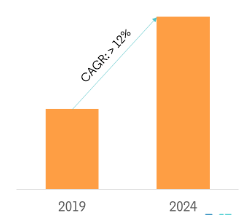Although unmanned vehicles have been used for decades, their applicability in cargo transport is now slowly being recognized (Knoblauch et al., 2019). As a venture capitalist seeking a start-up company, the use of unmanned systems in the commercial sector, especially long-distance cargo transport, is a relatively new technological adaptation that has the potential to yield significant gains in the future. The advantages of UCA include: they have a lower operating cost than manned systems, they have fewer scheduling limitations, and they unlock the economic potential of regions that were previously limited by the absence of a global cargo transport infrastructure (Heerkens, 2017). The increasing employment of Unmanned Aerial Vehicles (UAVs) in the transportation of cargo has been determined as one of the factors expected to lead to the growth of the unmanned systems market at a CAGR of 12% between 2019 and 2024 (Mordor Intelligence, 2019).

Moreover, coupled with significant investments made by companies such as Google, Amazon, and Qualcomm into the emerging technologies to make them autonomous are increasing. The Asia-Pacific region has been determined to generate the highest demand for such systems (Mordor Intelligence, 2019). For instance, Japan, India, and Indonesia are presently focused on designing UAVs that can be used in the transportation of cargo and parcels. However, one of the challenges affecting the success of the UCA is regulation. Many nations are faced with regulatory issues associated with drones, as technology has an impact on public safety. Regulators will be required to design a comprehensive suite of regulations to govern UCAs, and they may take longer to develop (Cohn, Green, Langstaff, & Roller, 2017).
References
Cohn, P., Green, A., Langstaff, M., & Roller M. (2017). Commercial drones are here: The future of unmanned aerial systems. Web.
Heerkens, H. (2017). Unmanned cargo aircraft: From anywhere to everywhere. Engineering & Technology Reference. Web.
Knoblauch, A., de la Rosa, S., Sherman, J., Blauvelt, C., Matemba, C., Maxim, L.,…Lapierre, S. (2019). Bi-directional drones to strengthen healthcare provision: Experiences and lessons from Madagascar, Malawi and Senegal. BMJ Global Health, 4, e001541. Web.
Mordor Intelligence. (2019). Unmanned systems market – Growth, trends, and forecast (2019 – 2024). Web.